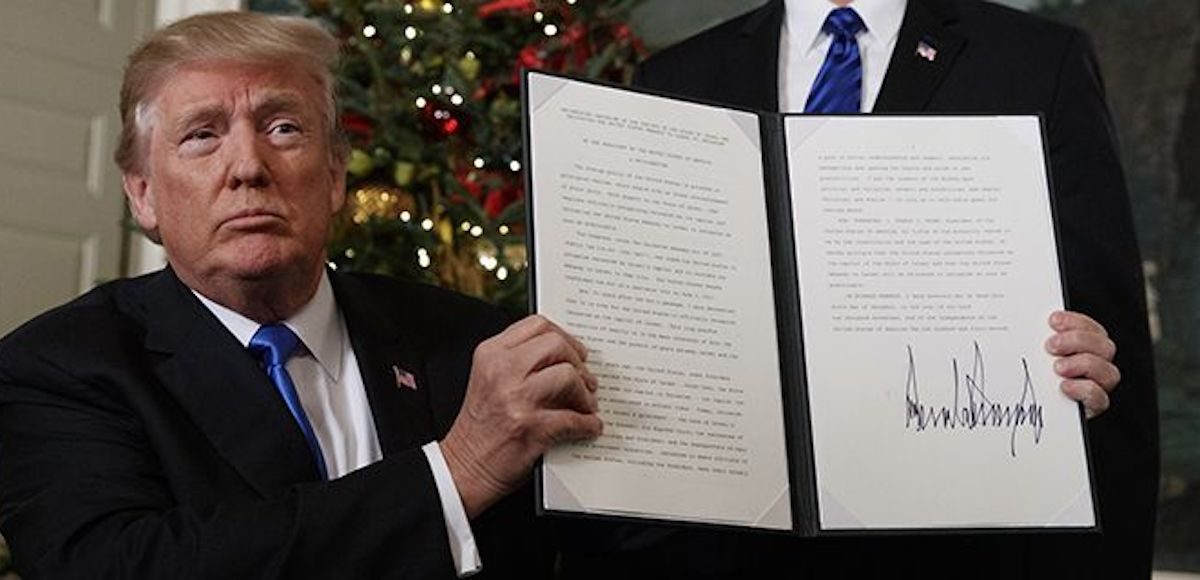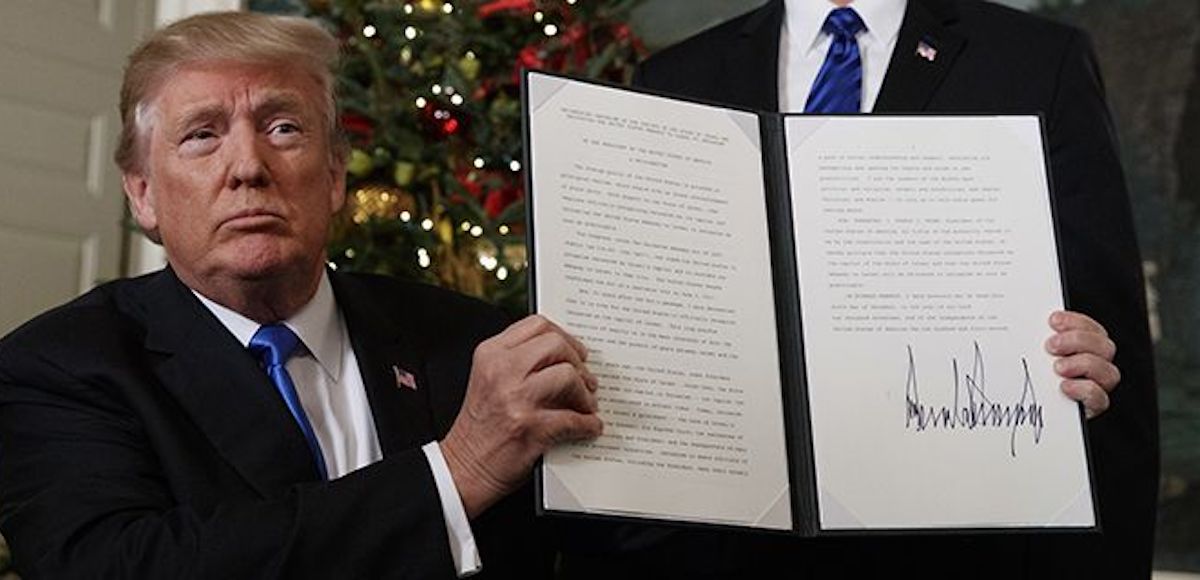

President Donald Trump in the Diplomatic Reception Room of the White House signs an order beginning the process of moving the U.S. Embassy in Tel Aviv, Israel to Jerusalem on December 6, 2017.
Happy New Year!
We listed yesterday the good and bad policy developments of 2017, so now let’s speculate about potential victories and defeats in 2018.
Here are two things I hope will happen this year.
- Welfare reform – If my friends and contacts on Capitol Hill are feeding my accurate information, we may see a bigger and better version of the 1996 welfare reform in 2018. The core concept would be to abolish the dozens of means-tested programs (i.e., redistribution programs targeted at low-income people) in Washington and replace them with a “block grant.” This could be good news for federal taxpayers if the annual block grant is designed to grow slowly. And it could be good news for poor people since state government would then have the ability and flexibility to design policies that help liberate recipients from government dependency.
- Collapse of Venezuela – Given the disastrous deterioration of the Venezuelan economy, it’s difficult to envision how the Maduro dictatorship can survive the year. Yes, I know the regime is willing to use the military to suppress any uprising, but I suspect hungry and desperate people are more likely to take chances. My fingers are crossed that the corrupt government is overthrown and Venezuela becomes another Chile (hopefully without a transition period of military rule).
Here are two things I fear may happen in 2018.
- Pulling out of NAFTA – America dodged a bullet in 2017. Given Trump’s protectionist instincts, I worried he would do something very dangerous on trade. But pain deferred is not the same thing as pain avoided. The President has made some very worrisome noises about NAFTA and it’s possible he may use executive authority to scrap a deal that has been good for the United States.
- A bad version of Brexit – Given the statist mindset in Brussels and the continent’s awful demographics, voting to leave the European Union was the right decision for our British friends.Simply stated, it makes no sense to stay on a sinking ship, even if it sinking slowly. But the net benefits of Brexit depend on whether the United Kingdom seizes the moment and adopts pro-growth policies such as tax cuts and free-trade pacts. Sadly, those good reforms don’t appear likely and it appears instead that the feckless Tory leadership will choose to become a satellite member of the EU, which means living under the thumb of Brussels and paying for harmonization, bureaucratization, and centralization. The worst possible outcome in the short run, though at least the U.K. is better positioned to fully extricate itself in the future.
I’m adding a new feature to my hopes-and-fears column this year.
These are issues where I think it’s likely that something consequential may occur, but I can’t figure out whether I should be optimistic or pessimistic. I sort of did this last year, listing Obamacare reform and Italian fiscal crisis as both hopes and fears.
It turns out I was right to be afraid about what would happen with Obamacare and I was wrong (or too early) to think something would happen with Italy.
Here are three things that could be consequential in 2018, but I can’t figure out whether to be hopeful or fearful.
- Infrastructure reform or boondoggle – I put an “infrastructure boondoggle” as one of my fears last year, but the President and Congress postponed dealing with the issue. But it will be addressed this year. I’m still afraid the result may be a traditional pile of pork-barrel spending, but it’s also possible that legislation could be a vehicle for market-based reform.
- Normalization of monetary policy – I try to stay clear of monetary policy, but I also recognize that it’s a very important issue. Indeed, if I was to pick the greatest risk to the economy, it’s that easy-money policies (such as artificially low interest rates) have created a bubble. And bursting bubbles can be very messy, as we learned (or should have learned) in 2008. The Federal Reserve supposedly is in the process of “normalizing” monetary policy. I very much hope they can move in the right direction without rattling markets and/or bursting bubbles.
- A China bubble – Speaking of macroeconomic risks, I’m very glad that China has partially liberalized and I’m ecstatic that reform has dramatically reduced severe poverty, but I also worry that the government plays far too large a role in the banking sector and interferes far too much in the allocation of capital. I’m guessing this eventually leads to some sort of hiccup (or worse) for the Chinese economy, and all I can do is cross my fingers and hope that the government responds with additional liberalization rather than the bad policies being advocated by the OECD and IMF.
By the way, I fully expect the Democrats to sweep the 2018 elections. And since the Party is now much farther to the left than it used to be, that could lead to very bad news in 2019 – particularly if Trump unleashes his inner Nixon.





